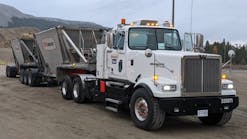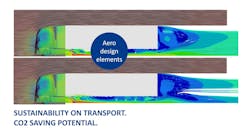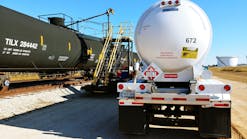Clean Trucks Program cuts pollution under current law, ATA tells House committee
The debate over the Port of Los Angeles’ effort to ban drayage truck owner-operators is not about clean air or reducing the environmental footprint at the Ports of Los Angeles and Long Beach, Robert Digges Jr, vice-president and chief counsel of the American Trucking Associations (ATA) told a subcommittee of the US House Transportation & Infrastructure Committee recently.
“ATA initiated litigation … against the Ports of Los Angeles and Long Beach challenging their use of mandatory Concession Agreements to implement their respective Clean Truck Programs. Our aim then and now is not to block or hinder implementation of the truck retirement-clean air portions of these programs. What we are opposing is the banning of the independent contractor business model at the port as well as the mandated use of a concession contract by which the port grants to itself discretion to decide which otherwise federally qualified motor carriers can participate in port transportation services,” said Digges.
The Clean Trucks Programs at the Ports of Los Angeles and Long Beach has accomplished impressive results without concession requirements, reducing truck pollution by 80% almost three years ahead of schedule.
“Moreover, over 6,500 clean trucks now serve the ports and most of the new fleets were financed with private—not public or port—funding. In fact the trucking industry has actually spent approximately $600 million of its own money to finance new clean truck purchases, more than 10 times more than the Port of Los Angeles has to date redistributed to the program from its container fee collections. Even though the ‘retired trucks’ are permitted to operate everywhere else in the country, the trucking industry has supported their early retirement at the ports, underscoring our commitment to improving air quality in the maritime transportation-container trades sector,” said Digges.
The Port of Long Beach never included a ban on owner-operators and reached a settlement with the trucking industry in October 2009. “The settlement was based upon a new motor carrier registration process which replaced the Port of Long Beach’s Concession Agreement, which is the focus of the ATA legal challenge. As a result of the settlement, Los Angeles is now the sole defendant in this case,” said Digges.
“All motor carriers now wishing to perform drayage services at [Long Beach] must, via the new Registration and Agreement Form, register with the port and agree to provide certain operational information to assist the port in monitoring motor carrier compliance with various safety, environmental, and security regulations pertaining to providing drayage services at the port,” said Digges.
In the lawsuit, ATA asserts that the Port of Los Angeles Concession Plan is pre-empted by federal statute. Specifically, under F4A–49 USC § 14501(c)(1), “a political subdivision of a state ‘may not enact or enforce a law, regulation, or other provision having the force and effect of law related to a price, route, or service of any motor carrier.’ The LA Concession Plan on its face controls access to the port drayage market, and many of its provisions will have a major impact on motor carrier rates and services,” said Digges.
His testimony can be found at www.truckline.com/Newsroom/Pages/testimony.aspx.








